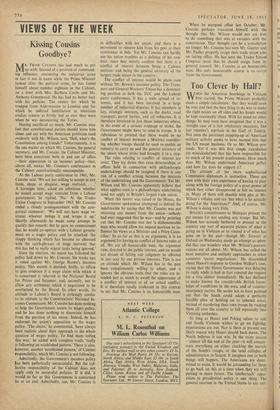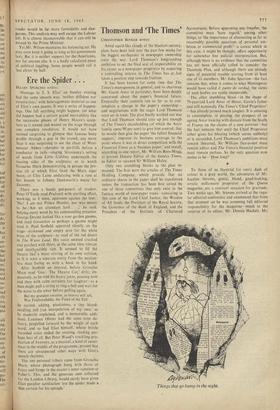Too Clever by Half?
WLIEN the American bombings in Vietnam first started, the Prime Minister probably made a simple calculation : that they would soon be over and that the best thing to do was to make the right noises on all sides and his hands would be kept reasonably clean. With his mind on other things, he may even have imagined that it was a straight case of a few retaliatory measures, like last summer's reprisals in the Gulf of Tonkin. Not even the persistent stepping-up of American military activity seems to have warned him that the US meant business. Or so Mr. Wilson pre- tends. Yet it was this first simple calculation (or miscalculation) that has been responsible for so much of his present predicament. How much does Mr. Wilson understand American policy and how far does he support it?
The attitude of the more sophisticated Communist diplomats is instructive. These are men with their own experience of having to play along with the foreign policy of a great power of which they either disapproved or felt no interest in. Many of them will chuckle with glee at Mr. Wilson's villainy and say 'but what is he actually doing for the Americans?' And, of course, Mr. Wilson is doing very little.
Britain's commitments to Malaysia present the pat excuse for not sending any troops. But Mr. Wilson has scarcely bothered to present to the country any sort of accurate picture of what is going on in Vietnam or to remind it of what has gone on in the past—though Mr. Stewart at Oxford on Wednesday made an attempt so splen- did that one wonders what Mr. Wilson's prevari- cations are all about. Mr. Wilson has called the most tentative and unlikely approaches to other countries 'secret negotiations.' He dissembled about Hanoi'S response to Gordon Walker's tour, saying that the Hanoi Government was delaying its reply while it had in fact rejected the request for a visa almost immediately. He has declined to make known the considerable British know- ledge of conditions in the area, and of counter- insurgency tactics. He seems not to have pointed out that the South could adopt a perfectly feasible plan of holding on to selected areas, instead of murdering their own troops by rushing them all over the country to fall repeatedly into Vietcong ambushes.
So long as Hanoi and Peking refuse to talk and South Vietnam wishes to go on fighting, negotiations are out. Nor is there at present any likely reason why Hanoi should back down. The North believes it can win. In the rainy season —almost till the end of the year—it will concen- trate everything on either cracking the morale of the South's troops, or the total collapse. of administration in Saigon. It imagines one or both things will happen. The Americans are deter- mined to resist. It would be astounding for them to go back on this at a time when they arc still putting in more forces. The intellectuals' oppo- sition to presidential policy is one thing. The general reaction in the United States to any stir- Tender would be far more formidable and dan- gerous. This analysis may well escape the Labour left. It is almost inconceivable that it can still be missed by the Prime Minister.
Yet Mr. Wilson maintains his balancing act. He 'nay even keep it going as long as his government lasts. Out it is neither support for the Americans, nor for anyone else. It is a badly calculated piece of political juggling. Some people would call it 'too clever by half.'































 Previous page
Previous page